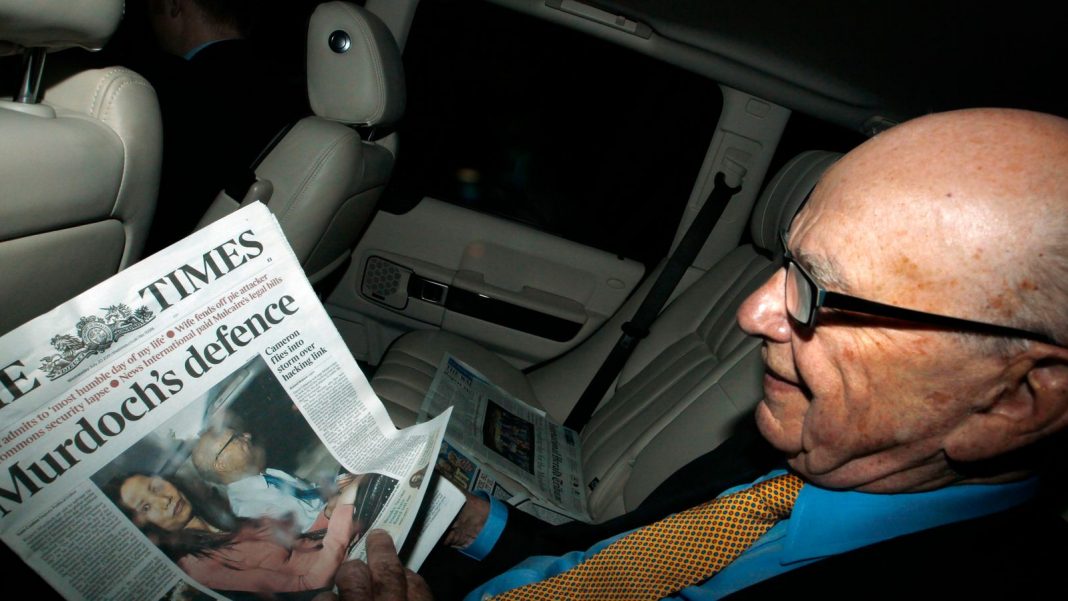Rupert Murdoch’s resignation as chairman of Fox and News Corporation brings a formal end to a 70-year career that brought him huge commercial success, profound political influence and deep controversy.
A disruptive and divisive figure, Murdoch’s talent for innovation and appetite for confrontation broke new ground in newspapers, broadcasting and entertainment, and with mass audiences came the ability to shape politics in the UK, the US and his native Australia.
As a consequence his professional legacy is contentious. To his supporters, Murdoch is a champion of popular entertainment, accessible news and a free and fearless press; to his detractors, he has been a malign influence who coarsened public debate, enabled a new wave of populism, and whose business was tainted by criminality.
Few would argue however that he has been one of the most significant business and political figures of the age.
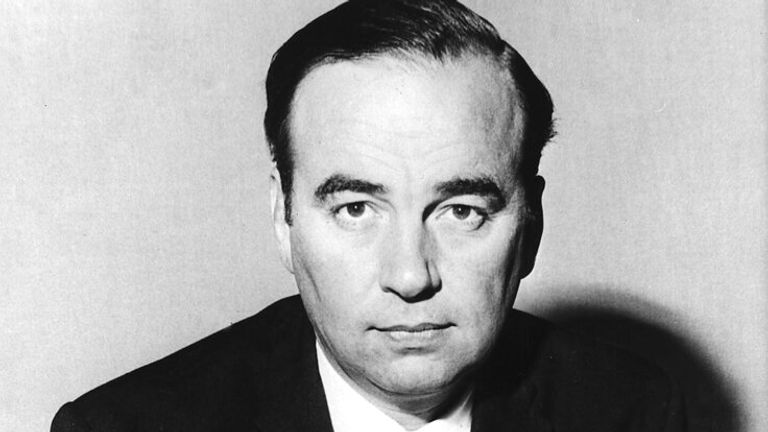
Rupert Murdoch photographed in 1969. Pic: AP
Foundations of an empire
Rupert Keith Murdoch, born in Melbourne in 1931, has always presented himself as an outsider with no time for elites, but he is a child of the Australian media establishment.
His father was reporter and newspaper proprietor Keith Murdoch, who made his name evading military censors to report on the chaotic and deadly Gallipoli campaign, which cost the lives of more than 40,000 Allied troops, many of them from Australia and New Zealand.
Eventually knighted for his services to journalism, Sir Keith passed on to his son a love of newspapers, a taste for the power of journalism and a platform to exercise it.
Sir Keith would become editor, managing director and finally chairman of the Melbourne-based Herald Group, and then bought his own papers including The News in Adelaide, a title with 75,000 readers that he left to his son when he died in 1952.
It was the foundation stone of an empire that today still includes two-thirds of Australian media.
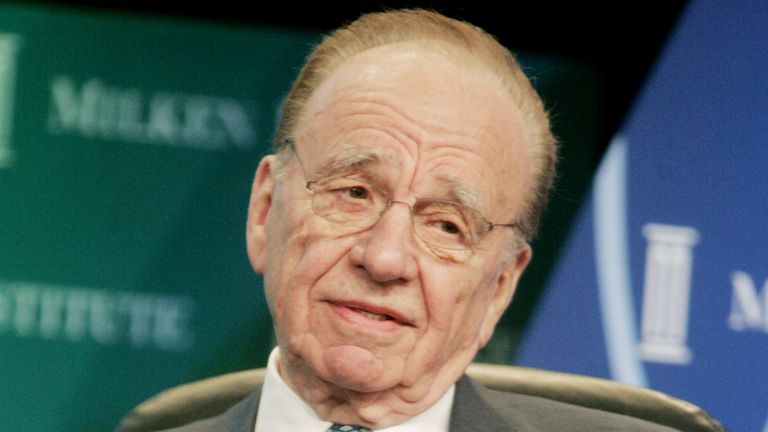
Murdoch’s profound and often controversial career spanned seven decades
‘Sex, sport and contests’
By the 1960s, having completed an Oxford degree (PPE) and served a proprietor’s apprenticeship at home, Murdoch turned his attention to international expansion, starting in London.
In 1969 he bought the News Of The World and then, wanting a daily paper to share the overheads, The Sun – at the time a nondescript broadsheet that cost him barely £1m.
He was a genuine outsider in a British newspaper establishment dominated by editorial giants like Hugh Cudlipp and William Beaverbrook, editor and proprietor respectively of the Mirror and the Daily Express, who claimed close to eight million readers a day between them. Within a decade, Murdoch’s papers would eclipse them both.
He set out his priorities in an early meeting, telling Sun staff that “sex, sport and contests” would revive circulation. Rebranded in tabloid format with a distinctive red masthead, with topless models featuring daily on Page 3 from 1970, it was a wildly successful formula that pushed its rivals to compete in similar vein.
Driven by an aggressive price war with Robert Maxwell’s Mirror Group, the tabloid culture reached its apogee in the 1980s and 1990s, with no area of public life spared. Sensation sold, whether it was the breakup of Charles and Diana, reported in excruciating detail, or endless celebrity transgressions.
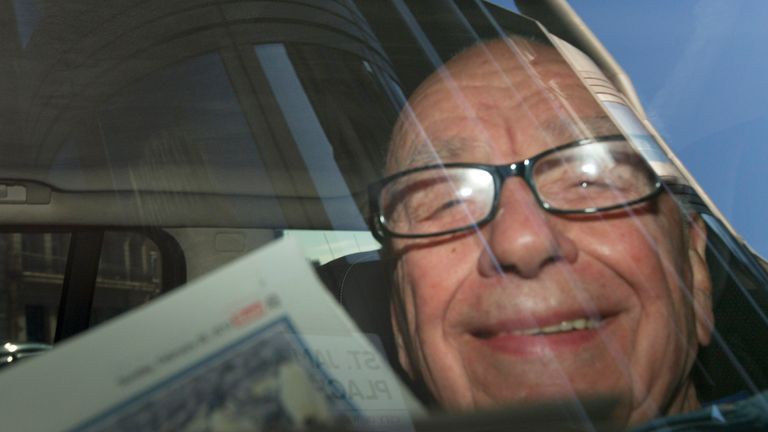
Murdoch reading The Sun as he is driven away from his central London home in 2012
Murdoch’s popular papers were patriotic to the point of jingoism – cheering British troops off to the Falklands in 1982, and celebrating the sinking of Argentine warship the General Belgrano with the infamous headline “GOTCHA”. They also nurtured an intolerant streak, demonising homosexuality at the height of the AIDS epidemic.
The tone chimed with the times and the government of Margaret Thatcher, for whom The Sun was a champion and cheerleader, praising her transformational economic policies and relentlessly attacking Labour to its four million readers.
When Thatcher’s successor John Major won an unlikely majority at the 1992 general election, The Sun claimed victory for a polling day front page ridiculing Labour leader Neil Kinnock, running the follow-up “IT WAS THE SUN WOT WON IT!”
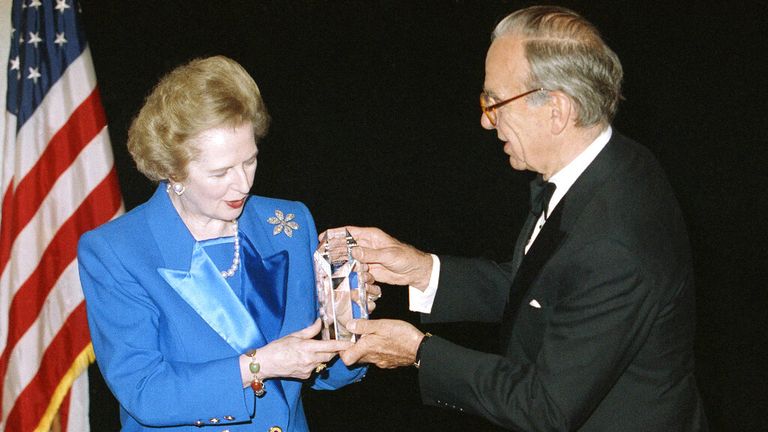
Murdoch presenting Margaret Thatcher with a humanitarian award in 1991. Pic: AP
The paper also tapped into Thatcher’s growing euroscepticism at the turn of 90s, running regular critiques of perceived EU meddling and turning previously anonymous Brussels bureaucrats into pantomime villains.
Notoriously, EU Commission President Jacques Delors was dismissed with the headline “UP YOURS DELORS!”
Support for Thatcher smoothed the way for expansion. While The Sun and News Of The World scandalised, Murdoch furthered his influence by purchasing the ultimate establishment title, The Times, in 1981 – adding The Sunday Times when the prime minister decided not to refer the takeover to the Monopoly Commission.

With a stable of titles under his News International brand all dependent on the goodwill of print unions still operating with almost comically restrictive working practices, Murdoch executed perhaps his most audacious and impactful intervention in the UK market.
Secretly he constructed new printworks at Wapping in east London, where electronic composition would replace the labour-intensive hot metal process. After a redundancy offer was refused and a strike announced by union staff in January 1986, at a stroke he switched all production to the new plant.
A protracted and sometimes violent dispute followed, lasting more than a year but ending in victory for Murdoch, enabled by the Thatcher government’s legislation to curb union power. Coming a year after the miners’ strike, it helped embed a fundamental shift in industrial relations.
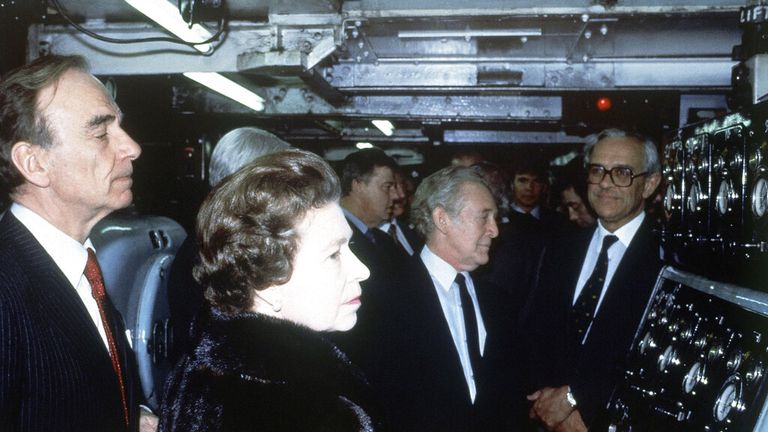
Murdoch and the late Queen watching The Times go to press in 1985 during a royal visit. Pic: AP
Within two years the rest of Fleet Street had followed Murdoch’s lead, but politically he proved himself a pragmatist as the Conservatives’ star waned. After 20 years of enthusiastic support for the Conservatives, Murdoch’s titles switched their support to Tony Blair in 1997, when it was clear New Labour was on course for victory.
Despite a consistent backing for right-of-centre politicians around the world, Murdoch above all backed winners, mindful of the benefits they could bring him.
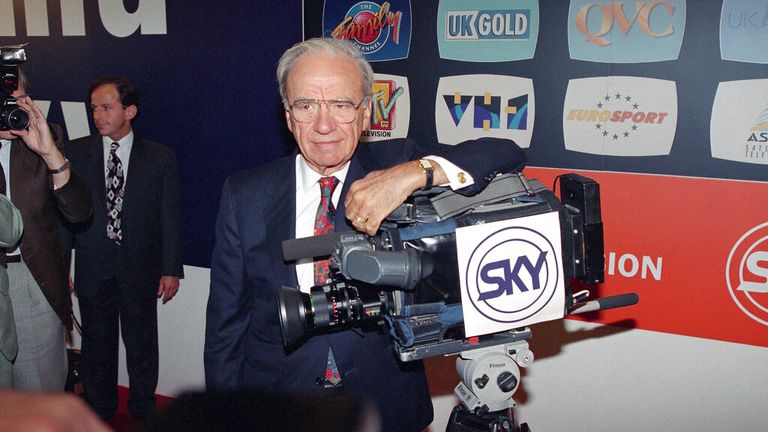
Pic: AP
Reach for the sky
While newspapers were in Murdoch’s blood they were just one arm of the media, and in the 1980s he sought expansion into broadcasting and competition with another establishment brand, this time the BBC.
When the government auctioned a single satellite broadcasting licence, Murdoch lost out to British Satellite Broadcasting. He went ahead anyway – founding Sky on a brownfield site near Heathrow in west London, but broadcasting initially from Luxembourg.
It was a scrappy start-up operation led largely by veterans of Murdoch’s Australian operations, and one that could have cost him everything.
He claimed to have “bet the farm” on a package that began with Sky News, movies and a handful of American channels, but sport was to prove the game changer.
In 1992, Sky won the rights to air top-flight football – with the first division rebranded as the Premier League and matches broadcast live across the week.
It transformed the company and the game, spawning a rights market now worth almost £2bn a year to the clubs, and becoming the foundation of a subscription model that in 2018 saw Sky, by now Europe’s largest broadcaster, valued at $39bn in a takeover by American cable giant Comcast.
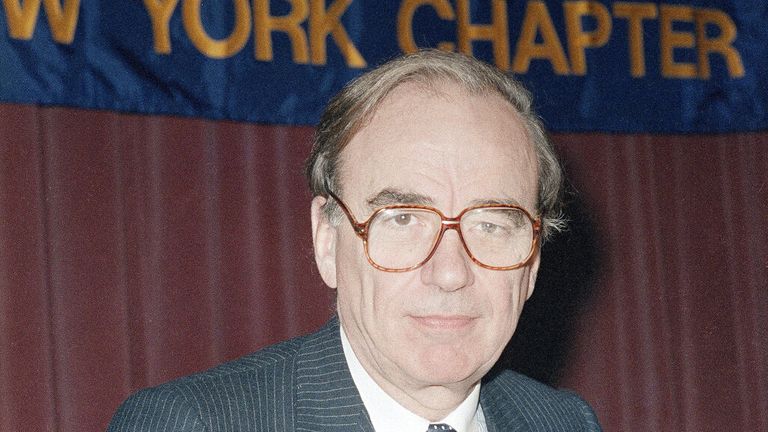
Pic: AP
Breaking America
Murdoch’s restless drive for empire building had taken him to America in the 1970s, where expansion followed a familiar pattern.
He bought the New York Daily Post in 1976, fashioned it into a rambunctious tabloid in keeping with the city’s character, then turned it to political effect.
He nurtured links with Ronald Reagan’s campaign for the presidency, who reportedly appreciated his support in helping win New York state for the Republicans, and in 1994 Murdoch bought a stake in 20th Century Fox, expanding his empire into Hollywood movies and entertainment as well as a network of local television stations.
Regulatory obstacles to co-ownership of newspapers and television stations in the same city melted away, thanks in part to Murdoch’s ability to deliver favourable coverage of political candidates or incumbents.
That ability moved into another gear in 1996 when Murdoch founded Fox News with former Richard Nixon adviser Roger Ailes.
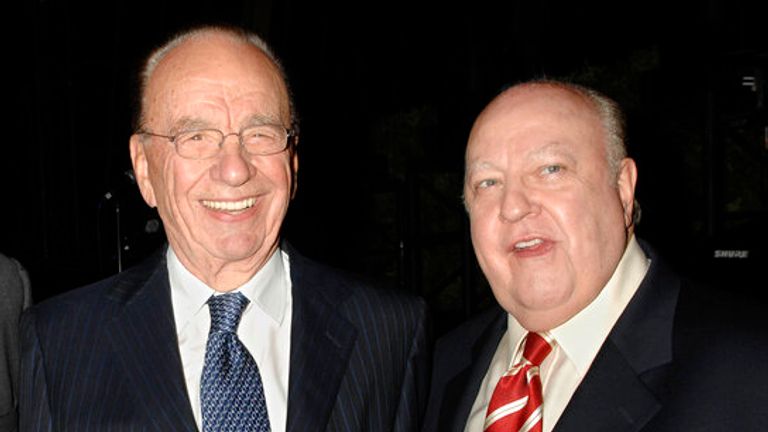
Pic: AP
With President Reagan having revoked the “Fairness Doctrine”, requiring broadcasters to present both sides of the story, Murdoch and Ailes were free to create a partisan platform the likes of which had never been seen.
In direct competition with the orthodox, liberal and self-consciously even-handed CNN, Fox News tacked hard to the right, making primetime stars of bellicose anchors and moving the political dial. Research showed that, when Fox began airing on local cable networks, support for Republican candidates rose. And it was profitable, generating billions of dollars in revenue.
The model reached its zenith with Fox’s support for Donald Trump, the reality show businessman who became president thanks in part to a base activated by Fox’s support.
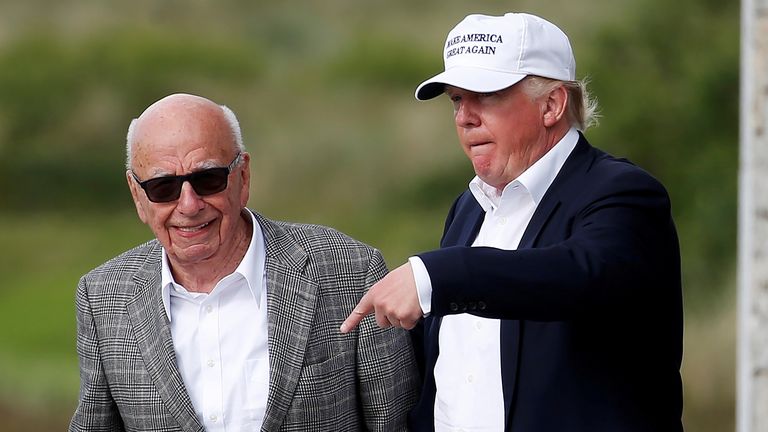
It is an association Murdoch came to regret. He is reported to have thought Trump “a f****** idiot”, but that did not prevent the businessman occupying a regular Monday morning slot on the Fox & Friends breakfast show.
Trump used that to routinely attack then President Obama with baseless conspiracies about his place of birth, before parlaying that popularity into a presidential campaign.
Fox’s role in enabling Trump’s successful 2016 campaign and its coverage of the aftermath of his 2020 defeat, in which it amplified entirely false conspiracies that the election was stolen, is perhaps Murdoch’s most contentious career legacy.
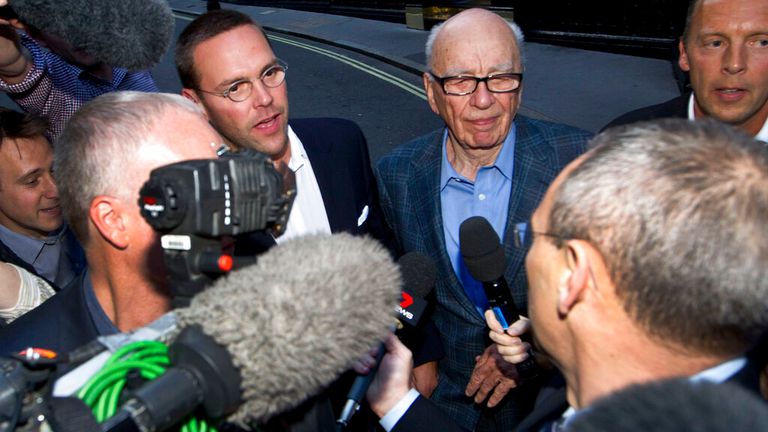
Rupert Murdoch and son James as it was announced the News Of The World would close. Pic: AP
The reckoning
Murdoch’s greatest successes were also the source of his greatest scandals, leading to the closure of his most notorious paper, and the shaming of Fox News.
In 2006 it was revealed that the News Of The World had “hacked” the mobile phone of Prince William, using a simple override to listen to voice messages and using what they heard as the basis of stories in the paper.
The paper’s royal editor and a private investigator were jailed – but in 2009 and 2010, The Guardian reported that hacking was more widespread, and that News International had reached multimillion-pound settlements with a number of celebrities.
The following year, just as Murdoch was plotting a full takeover of Sky, The Guardian revealed that reporters at the News Of The World had hacked the phone of Milly Dowler, a murdered schoolgirl.
Amid public outrage, with Prime Minister David Cameron announcing a public inquiry and his communications director, former News Of The World editor Andy Coulson, arrested, Murdoch closed the paper.
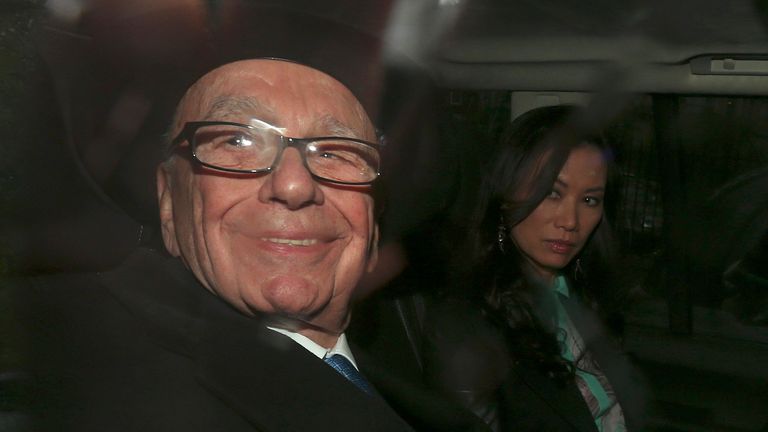
Murdoch, with then-wife Wendi Deng, after giving evidence to the Leveson Inquiry in 2012
It was a ruthless act of self-preservation, sacrificing a lucrative and successful title to try and confine the damage to his newspaper division, and protect – unsuccessfully as it turned out – his bid for full ownership of Sky. His son James, the third of Murdoch’s six children, was forced to resign as chief executive.
At a subsequent parliamentary hearing, Murdoch described his appearance as “the most humble day of my life”, shortly before a protester shoved a plate of shaving foam in his face.
Almost 20 years on, News International is estimated to have privately paid hundreds of millions in damages, and the case rumbles on. In 2023, Prince Harry was among a host of public figures and celebrities seeking damages for hacking by the Sun, which always denied wrongdoing.
Read more:
Murdoch abandons bid to reunite News Corp and Fox Corp
Fox News agrees $settlement in vote-rigging claims lawsuit
In the US a reckoning for Fox News’ excesses took a little longer, but finally came in 2023, the result of a lawsuit brought by Dominion Voting Systems, a manufacturer of vote counting software used in the 2020 election.
In the aftermath of Trump’s defeat, Fox anchors repeated his false claims that the machines had been instructed to switch votes from Trump to Joe Biden. In pre-trial discovery it emerged that they, and Murdoch, did not believe the former president but broadcast the claims anyway, in part from fear of alienating their loyalist audience.
Murdoch was said to have called it “really crazy stuff” and described comments from Trump loyalists on the channel as “terrible stuff damaging everybody, I fear”.
Facing giving evidence in person, he authorised a $787.5m (£641m) payment to settle the case. Tucker Carlson, Fox’s most popular presenter, was fired without notice.

Pic: AP
The empire cuts back
By the 2020s and the nadir of Trump’s defeat, Murdoch’s empire was, for the first time, smaller. In 2018 he took the momentous decision to sell his prize asset 21st Century Fox, concluding that even he could not muster the scale to compete with the new social media and streaming giants.
His first choice was a sale to Disney, the home of the permanently smiling Mickey Mouse – apparently the polar opposite of Fox’s snarl. A deal was done in principle with Disney boss Bob Iger that would see the entertainment division sold, while Murdoch hung on to Fox News and Fox Sports, as well as his American papers, The New York Post and The Wall Street Journal.
Please use Chrome browser for a more accessible video player
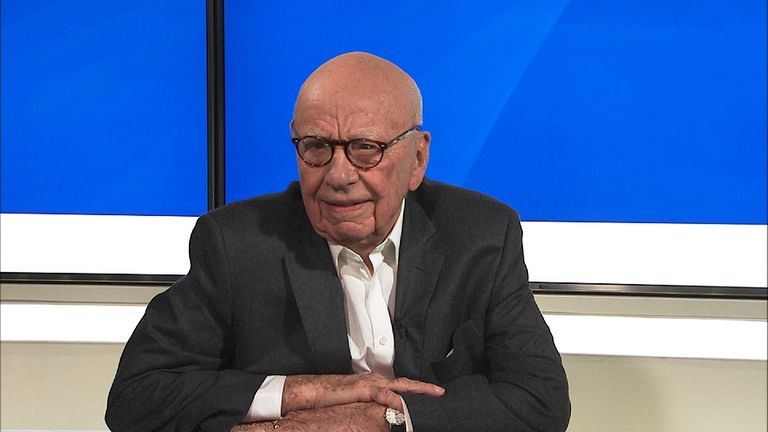
12:27
December 2017: Rupert Murdoch interview in full
In Europe, Fox’s 39% stake in Sky would be sold too, subject to regulatory approval that had twice proved impossible for Murdoch to clear when he wanted to take full control.
The sale turned into an auction however, with NBC owner Comcast joining the bidding, driving Disney’s eventual price to $71bn from an original $52bn. In the UK, Comcast did outbid Disney and took control of Sky, leaving Murdoch with his British newspapers.
Remarkably, Murdoch concluded the biggest deals of his life in his late 80s, estimated to have netted him $4bn personally and a further $2bn to each of his adult children.
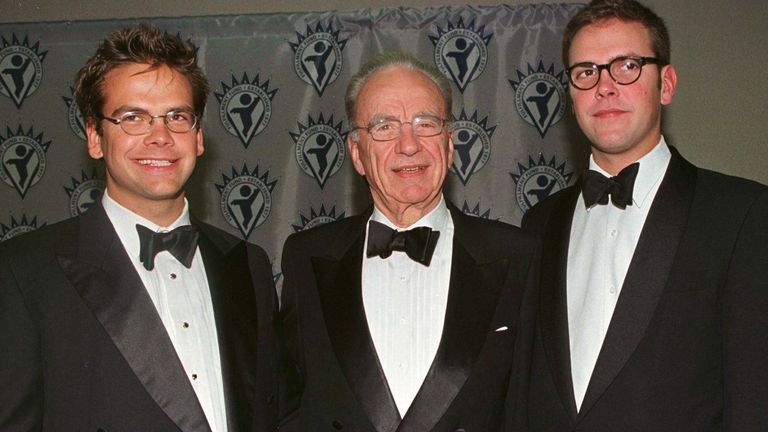
Murdoch with his sons, Lachlan, left, and James, right, in Los Angeles in 1998
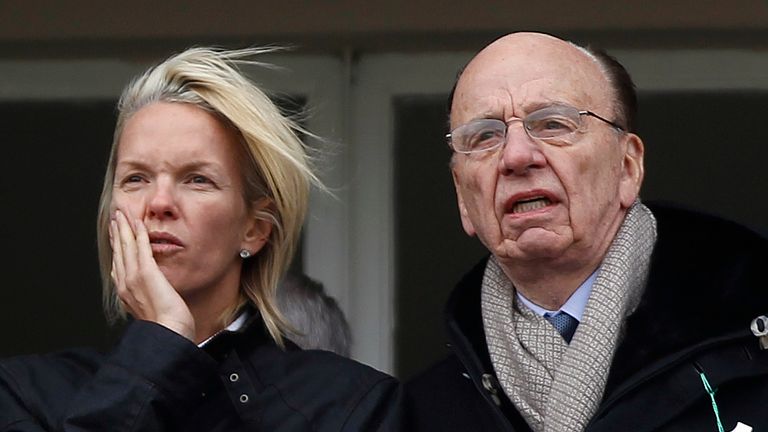
Murdoch with his daughter, Elisabeth, at Cheltenham Festival in 2010
Succession
Murdoch’s private life and the roles of his children in the business empire have long been subject to the sort of scrutiny his titles reserve for other people.
Married and divorced four times, he has six children.
The eldest Prudence was born to his first wife Patricia and has the lowest profile, and he has two children from his third marriage to Chinese television executive Wendi Deng, Grace and Chloe.
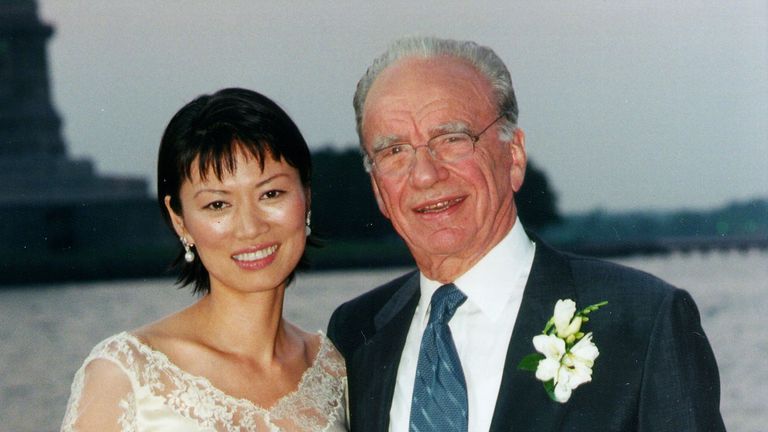
Rupert Murdoch and wife Wendi Deng tied the knot on his yacht in New York in 1999
His second marriage to Anna brought three children, Elisabeth, Lachlan and James, the three of them cast in a real-life soap opera that is an obvious inspiration for the HBO drama Succession, broadcast, with some irony, by Sky in the UK.
(Murdoch’s 2022 divorce settlement from his fourth wife, model Jerry Hall, is reported to stipulate she is not allowed to pass information to the show’s writers.)
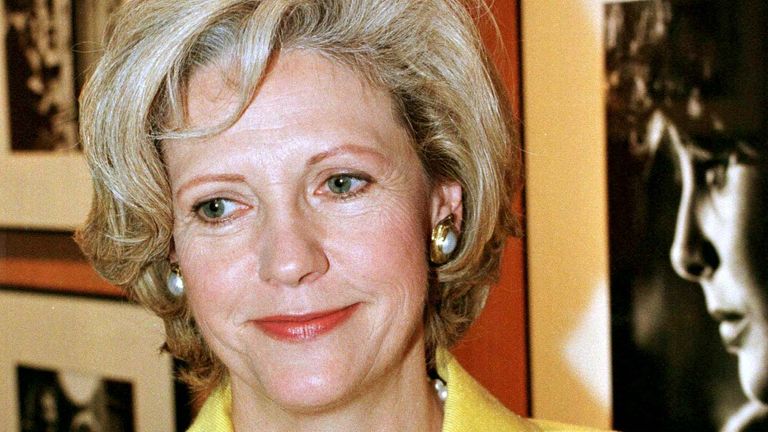
Murdoch’s second wife Anna is mother to his sons Lachlan and James and daughter Elisabeth
While Elisabeth built her own successful production company, James and Lachlan worked within the family business in Australia, the US and the UK, their stars rising and falling apparently at their fathers’ whim.
James was chief executive of Sky until the phone hacking scandal forced him out, and after a brief period as joint chiefs of 21st Century Fox beginning in 2015, Lachlan appeared to have emerged as the successor, running the US business as James stepped away to pursue his own ventures.
Lachlan’s victory in the sibling race appears to be confirmed by his appointment as his father’s replacement as chair of News Corporation and sole executive chair of Fox, but this may still be a turning point for the empire.
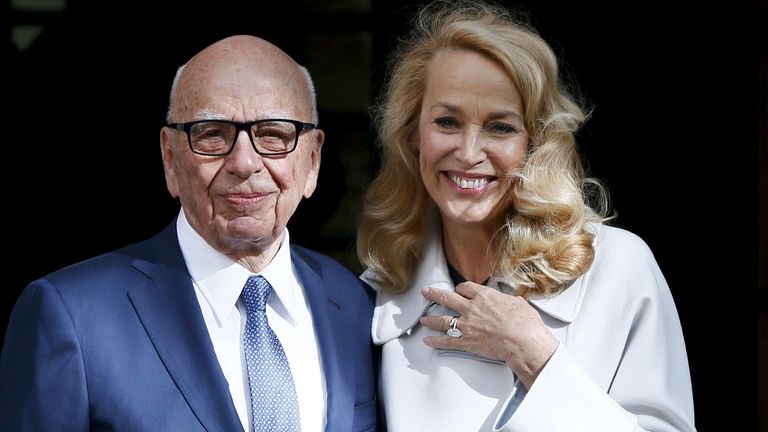
Rupert Murdoch with his fourth wife, supermodel Jerry Hall
While Rupert Murdoch’s grasp of operations and decision making at 92 has been questioned in recent years, not least by his biographer Michael Wolff in an impending book, his presence has mattered.
His absence from day-to-day operations, no matter how theoretical that has become in practice, may threaten family control.
Crucial will be what happens to the voting rights over the family shares he has divided with tantalising balance between himself and his four eldest children.
Under the terms of the Murdoch Family Trust, which owns the controlling stake in each business, he has four votes and the children one each. The corporate succession battle may not end with his resignation.


